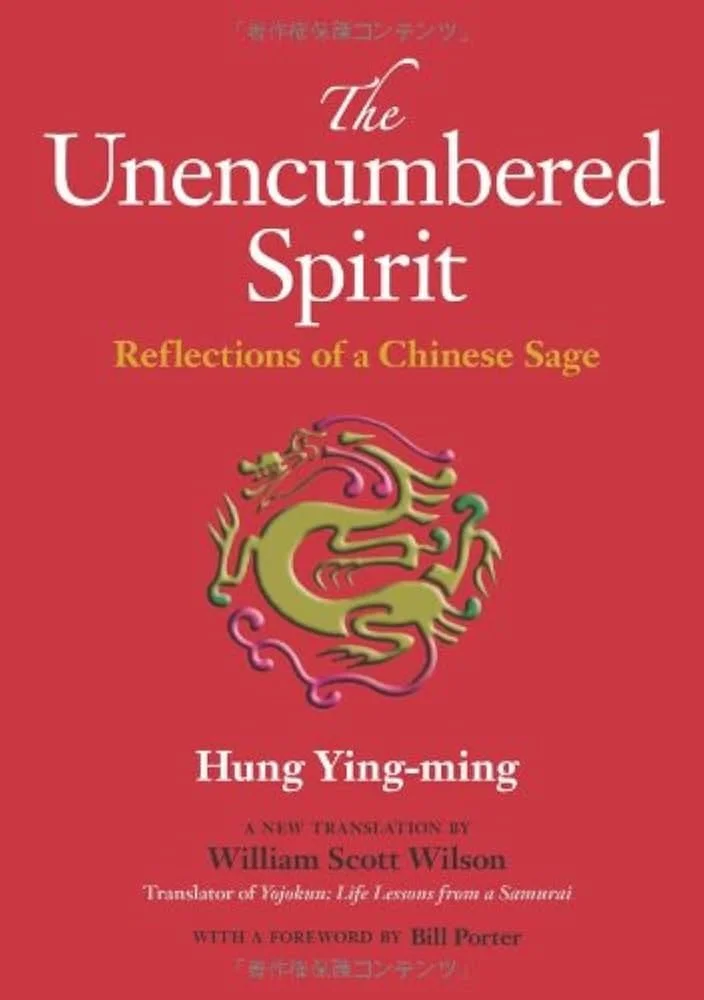The Unencumbered Spirit : Reflections of a Chinese Sage by Hung Ying-ming, translated by William Scott Wilson (Kodansha International) ~Ernie Hoyt
Not much is known about Hung Ying-ming. What is known is that he was a Chinese sage who lived near the end of the Ming Dynasty (1368-1644). From his writing, most scholars agree that he was well-read and cultured. He was a follower of the Unity of Three Creeds - Taoism, Confucianism, and Buddhism.
Taosism, founded by Lao Tzu, emphasizes harmony with the Tao, often translated into English as the “way” or “path”. The belief focuses on the relationship between the natural world and the body.
Confucianisism, founded by Confucious around 500 B.C.E., isn’t concerned with the natural world and the human body but is a philosophy on society and human relationships. Its main focus being virtue, social harmony, and familial responsibility.
Buddhism was not about the natural world and the human body, nor was it about society and human relationships. This belief focused on the mind and the suffering that arises from its misuse.
The Chinese did not see these three beliefs as conflicting traditions but as complementary. Even if a person chose to emphasize one over the other, they hardly ever dismissed the other beliefs. The Chinese believe that each belief focuses on a different aspect of the human condition.
“Taoism seeks the harmony of the body, Confucianism seeks the harmony of society, and Buddhism seeks the harmony of the mind”. If only Christianity or Islam could follow the Chinese way of thinking, perhaps the world would be a better and safer place.
Hung Ying-ming was believed to be a member of the Chinese literati who enjoyed a simple life, “a type of man who found fulfillment in simple pleasures: reading classic literature, contemplating the Three Creeds, strolling through nature, laughing and drinking with friends, and practicing various accomplishments from calligraphy to the martial arts”.
The Unencumbered Spirit is a collection of Hung Ying-ming’s writings on how to live a simple and satisfying life. He talks about “good and evil, honesty and deception, wisdom and foolishness, heaven and hell” and more. Although he lived hundreds of years ago, many of his writings still hold true today.
One of the sayings seems directly related to the current leader of the United States of America. “If a man of high rank uselessly indulges in his power or markets his position, he becomes in the end, only a titled beggar”. Unfortunately, the man in power still holds his position and there are many who blindly follow him.
Another one of Ying-ming’s sayings rings true in the current state of American politics - “A person brought up closely surrounded by wealth and rank will have appetites like raging fires and wield power like violent flames”. We can only hope that the rest of the saying will come true as well - “If he cannot become cool and clear, if his flames do not actually burn someone else, they will surely scorch the man himself”.
One final saying I thought related to those who thirst for power is, “Title and rank should not be elevated too high. Once a high elevation is reached, there is danger”. We’ve already seen the dangers set by the current President of the United States as he tries to become more like a dictator than a leader of a democracy.
I would like to highlight those passages and send it to the man in the Oval Office at the White House. However, if I were to do that, I may become a target of his repressive administration.
